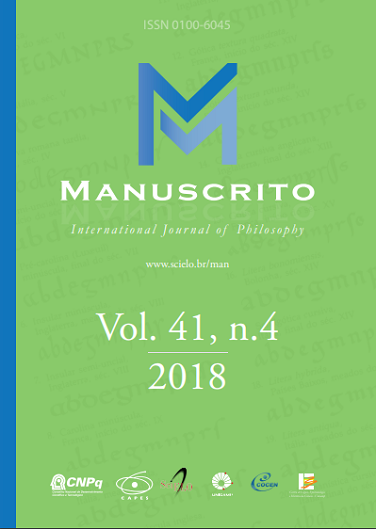Resumen
What does bodily pain have in common with mental pain? According to “evaluativism”, both are representations of something bad. This paper puts forward three claims. First, that evaluativism vis-à-vis bodily pain is false for it renders it irrational to take painkillers. Second, that evaluativism vis-à-vis mental pain is true. Third, that this difference between bodily and mental pain stems from the fact that only the latter is normative, that is, based on reasons. The normative difference between bodily and mental pain implies that mental pains are not bad, while bodily pains are not representations.Citas
BAIN, D. “What Makes Pains Unpleasant?”, Philosophical Studies, 166: 69-89, 2013.
BAIN, D. “Pains That Don't Hurt.” Forthcoming in Australasian Journal of Philosophy, Vol. 92, No. 2, 305–320, 2014.
BAIN, D. “Why Take Painkillers.” Forthcoming in Nous, 2017.
BITTNER, R. “Is it Reasonable to Regret Things One Did?” The Journal of Philosophy, 89: 262-73, 1992.
BYRNE, A. ‘Intentionalism Defended’, Philosophical Review, 110: 199–239, 2001.
BYRNE, A. & TYE, M. “Qualia ain't in the head.” Nous 40(2): 241–255, 2006.
CUTTER, B. and TYE, M. “Tracking Representationalism and the Painfulness of Pain”, Philosophical Issues, 21, 90-109, 2011.
CUTTER, B. & TYE, M. “Pains and Reasons: Why It Is Rational to Kill the Messenger.” The Philosophical Quarterly 64(256): 423–433, 2014.
D’ARMS, J. & JACOBSON, D. “The Moralistic Fallacy: On the ‘Appropriateness’ of Emotion.” Philosophy and Phenomenological Research, 61: 65-90, 2000.
DRETSKE, F. Naturalizing the Mind (MIT Press:Bradford Books, 1995).
HALL, R. J. “Are Pains Necessarily Unpleasant?”, Philosophy and Phenomenological Research 49: 643–659, 1989.
HELM, B. “Felt Evaluations: A Theory of Pleasure and Pain.” American Philosophical Quarterly, 39, 1, 13-30, 2002.
HIERONYMI, P. “The Wrong Kind of Reason.” Journal of Philosophy, 102: 437-457, 2005.
HIERONYMI, P. “The Use of Reasons in Thought (and the use of earmarks in arguments),” Ethics, 2012.
HUME, D. In L. A. Selby-Bigge & P. H. Nidditch (Eds.), A treatise of human nature (2nd ed.). Oxford: Oxford University Press, 1739/1978.
JACOBSON, H. “Killing the Messenger: Representationalism and the Painfulness of Pain.” The Philosophical Quarterly 63(252): 509–519, 2013.
JOLLIMORE, T. “Meaningful Happiness and Meaningful Suffering.” Southern Journal of Philosophy, Vol. XLII: 333-347, 2004.
KLEIN, C. What the Body Commands: The Imperative Theory of Pain. MIT Press, 2015.
KORSGAARD, C. The sources of normativity. Cambridge: Cambridge University Press, 1996.
LITTLE, M. “Virtue as Knowledge: Objections from the Philosophy of Mind.” Nous 31.1: 59-79, 1997.
MCDOWELL, J. "Projection and Truth in Ethics." Lindley Lecture 1987. University of Kansas. Reprinted in his Mind, Value and Reality. Cambridge, MA. Harvard University Press. 1998: 151-66, 1987.
MCDOWELL, J. "Virtue and Reason." Reprinted in his 1998: 50-73, 1979.
NAGEL, T. The Possibility of Altruism (Princeton University Press), 1970.
NIETZSCHE, F. The Gay Science. Ed. By B. Williams (Cambridge: Cambridge University Press), 2001.
NUSSBAUM, M. Upheavals of Thought (Cambridge: Cambridge University Press), 2001.
PARFIT, D. ‘Rationality and Reasons,’ in Dan Egonsson et al. (eds.), Exploring Practical Philosophy (Burlington VT: Ashgate), 17–39, 2001.
PILLER, C. “Normative Practical Reasoning,” Proceedings of the Aristotelian Society 75, Supp (1), 195–216, 2001.
SARTRE, P. [1943] Being and Nothingness, Philosophy Library Inc, 1992 [1943].
SCANLON, T. What We Owe to Each Other, Cambridge MA: Harvard University Press, 1998.
SCHROEDER, M. “The Ubiquity of State-Given Reasons,” Ethics 122: 457-488, 2012.
SPINOZA, B. Ethics. Translated by E. Curley (Penguin Classics), 2005.
STAMP, D. The authority of desire. Philosophical Review, 96, 335–381, 1987.
TAYLOR, G. Pride, Shame, and Guilt: Emotions of Self-assessment. New York: Oxford University Press, 1985.
TYE, M. Ten Problems of Consciousness: A representational theory of the phenomenal mind. Cambridge: MIT Press, 1995.
TYE, M. “Another Look at Representationalism about Pain.” In Pain: New Essays on Its Nature and the Methodology of Its Study, edited by M. Aydede. Cambridge, Massachusetts: MIT Press, 2005.
WALLACE, J. The View from Here. On Affirmation, Attachment, and the Limits of Regret (New York: Oxford University Press), 2013.
WIGGINS, D. “A Sensible Subjectivism?” In his Needs, Values, Truth, 1998, 185-214. Oxford: Oxford University Press, 1987.
WIGGINS, D. "Truth, Invention, and the Meaning of Life." Reprinted in his 1998: 87-138, 1976.

